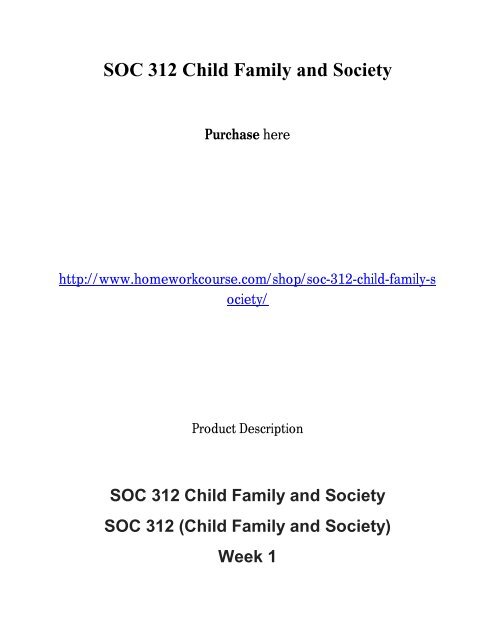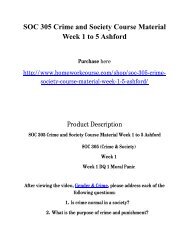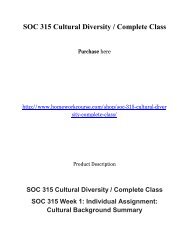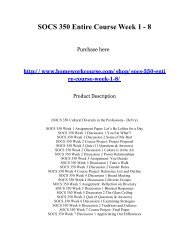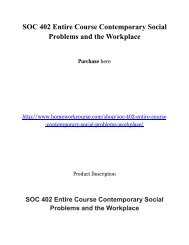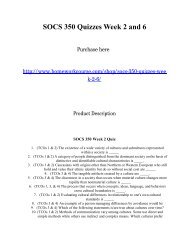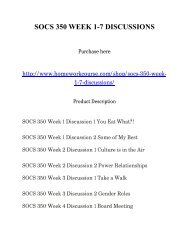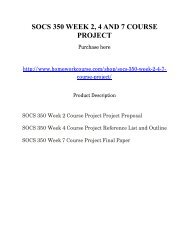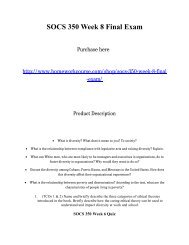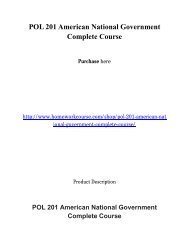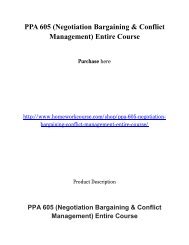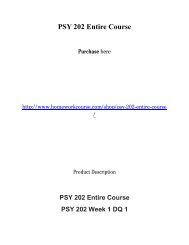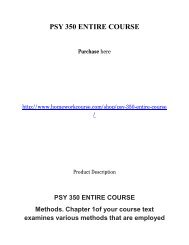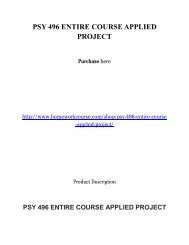SOC 312 Child Family and Society
Create successful ePaper yourself
Turn your PDF publications into a flip-book with our unique Google optimized e-Paper software.
<strong>SOC</strong> <strong>312</strong> <strong>Child</strong> <strong>Family</strong> <strong>and</strong> <strong>Society</strong><br />
Purchase here<br />
http://www.homeworkcourse.com/shop/soc-<strong>312</strong>-child-family-s<br />
ociety/<br />
Product Description<br />
<strong>SOC</strong> <strong>312</strong> <strong>Child</strong> <strong>Family</strong> <strong>and</strong> <strong>Society</strong><br />
<strong>SOC</strong> <strong>312</strong> (<strong>Child</strong> <strong>Family</strong> <strong>and</strong> <strong>Society</strong>)<br />
Week 1
Week 1 DQ 1 Bronfenbrenner’s Ecological<br />
Model<br />
Your text uses Bronfenbrenner’s ecological<br />
model to explain how children’s development<br />
is affected by different groups within their<br />
world. Using this theory, we can underst<strong>and</strong><br />
how children are socialized both intentionally<br />
<strong>and</strong> unintentionally. You must underst<strong>and</strong><br />
how this theory applies to your own upbringing<br />
as well as a young child’s upbringing in order<br />
to truly comprehend the concept. Use your<br />
underst<strong>and</strong>ing of this theory to respond to the<br />
questions below.<br />
Week 1 DQ 2<br />
Agents of Socialization<br />
Agents of socialization include parents,<br />
siblings, extended family, community, culture,<br />
economic environment, religion, child care,<br />
school, teachers, peers, formal organizations,<br />
sports, mass media, <strong>and</strong> technology. In an<br />
ideal world, these agents would complement<br />
one another in order to best influence a child’s<br />
development. Choose three of the above
agents <strong>and</strong> discuss how these agents can have<br />
both a positive <strong>and</strong> negative influence on a<br />
child’s development. Include examples from<br />
your own experience <strong>and</strong> share ways you<br />
believe the agents of socialization could be<br />
improved.<br />
Week 1 Assignments:<br />
<strong>SOC</strong> <strong>312</strong> Week 1 Journal Socialization<br />
<strong>SOC</strong> <strong>312</strong> Week 1 Quiz (10 Mcq’s)<br />
Week 2 DQ 1<br />
Week 2<br />
The Theory of Mind<br />
Watch the following short film, Theory of<br />
Mind.mov, demonstrating the theory of mind<br />
using a juice box experiment.<br />
At around four years of age, a fundamental<br />
change occurs in children’s underst<strong>and</strong>ing of<br />
others’ behaviors or what is also called theory<br />
of mind. Using your knowledge from our<br />
readings, watch the video to determine which
stage both Jacob <strong>and</strong> Patrick are currently in<br />
respectively.<br />
Discuss both Jacob’s <strong>and</strong> Patrick’s reaction to<br />
the “mean monkey.” What stage would<br />
Erickson say each child is in? How do these<br />
different stages influence their values <strong>and</strong><br />
attitudes? Do you think it is possible for a<br />
child over the age of three to have trouble<br />
underst<strong>and</strong>ing that his or her beliefs can be<br />
false? Explain your reasoning.<br />
Week DQ 2<br />
Self-Regulation<br />
Regardless of a child’s unique qualities, one<br />
thing remains the same; to improve learning<br />
<strong>and</strong> behavior, children must develop strong<br />
self-regulation skills. Read the following article<br />
from the National Association for the<br />
Education of Young <strong>Child</strong>ren (NAEYC),<br />
“Developing Young <strong>Child</strong>ren’s Self-Regulation<br />
Through Everyday Experiences.”<br />
Week 2 Assignments:
<strong>SOC</strong> <strong>312</strong> Week 2 Influence of Peers (600+<br />
Words)<br />
<strong>SOC</strong> <strong>312</strong> Week 2 Journal Gender Issues<br />
<strong>SOC</strong> <strong>312</strong> Week 2 Quiz (10 MCQ’s)<br />
Week 3 DQ 1<br />
Week 3<br />
Motivators<br />
You are a preschool teacher. Describe a<br />
situation in which you would use an extrinsic<br />
reward to motivate a preschooler. Discuss<br />
how these motivators could result in learned<br />
helplessness. Now give examples <strong>and</strong> explain<br />
how you can lead the same child to achieve<br />
intrinsic motivation by becoming their own<br />
locus of control. Keep in mind that your end<br />
goal is for the child to be intrinsically<br />
motivated so they have ownership of the<br />
behavior.<br />
Week 3 DQ 2<br />
Control<br />
The role of the microsystem in shaping<br />
children’s effortful control is important <strong>and</strong>
parents play a critical role. What would you<br />
recommend to a parent who asks you what he<br />
or she can do to promote his or her preschool<br />
child’s self-regulation skills? Now turning to<br />
the mesosystem, identify examples of<br />
influences on the child’s effortful control you<br />
can share with the parent.<br />
Provide examples of influences on children’s<br />
effortful control that you have observed in your<br />
own family <strong>and</strong> other families who are close to<br />
you.<br />
Week 3 Assignments:<br />
<strong>SOC</strong> <strong>312</strong> Week 3 Developmentally Appropriate<br />
Teaching Strategies (650+ Words)<br />
<strong>SOC</strong> <strong>312</strong> Week 3 Quiz (10 MCQ’s)<br />
Week 4 DQ 1<br />
Week 4<br />
Cultural <strong>and</strong> Linguistic<br />
Differences<br />
Listen to the Cultural <strong>and</strong> Linguistic<br />
Differences podcast from The IRIS Center, or
view the transcript. Consider what Donna<br />
Ford has to say about prejudice <strong>and</strong><br />
stereotyping.<br />
Discuss how educators can positively<br />
influence a school-age child to not hold biases<br />
or prejudices against others. Give an example<br />
of how you can create a community of learners<br />
who support one another by fostering positive<br />
attitudes. Give an example of how you could<br />
teach your students the importance of<br />
acceptance. Your post must address the<br />
children in the concrete operational stage.<br />
Week 4 DQ 2 Bullying<br />
Bullying is a prevalent issue during middle<br />
childhood. Watch following video, The Power<br />
of One – School Video Sample.<br />
Choose one of the situations presented: Diego,<br />
Timmy, or Kendra. Briefly describe the<br />
situation. Offer suggestions that can be put<br />
into place by the teacher, school, <strong>and</strong> the<br />
parents (at least one for each). Use the<br />
following resources to support your response:
Bullies: What is Bullying<br />
Stopbullying<br />
Week 4 Assignments:<br />
<strong>SOC</strong> <strong>312</strong> Week 4 Bullying…Change (700+<br />
Words)<br />
<strong>SOC</strong> <strong>312</strong> Week 4 Journal Private or Public<br />
Bully<br />
<strong>SOC</strong> <strong>312</strong> Week 4 Quiz (10 MCQ’s)<br />
Week 5<br />
Week 5 DQ 1 Technology<br />
Your text shares many negative effects of<br />
technology <strong>and</strong> the media’s influence on<br />
children. Regardless, technology is<br />
increasing rapidly <strong>and</strong> is only becoming a<br />
larger portion of our children’s lives. First,<br />
choose an age level (toddler, pre-school, or<br />
elementary age). Then, list three positive<br />
examples of how technology has enhanced<br />
socialization for children in that age<br />
group. Give two additional examples of how
parents/educators can use technology to<br />
further enhance a child’s socialization.<br />
Week 5 DQ 2<br />
Nonparental Care<br />
Choose one of the three nonparental care<br />
choices: nannies, center-based, or<br />
family-based care. Pretend you are trying to<br />
sell your chosen method of care to a<br />
prospective client who is a parent of a<br />
toddler. Share the advantages of your<br />
childcare setting so that the parent chooses<br />
your method to care for their child. Address<br />
the following in your post: socialization, cost,<br />
turnover, <strong>and</strong> any other points that you believe<br />
are necessary to sell your childcare option.<br />
Week 5 Assignments:<br />
<strong>SOC</strong> <strong>312</strong> Week 5 Final Project (14 Slides)<br />
<strong>SOC</strong> <strong>312</strong> Week 5 Journal Self-Assessment<br />
<strong>SOC</strong> <strong>312</strong> Week 5 Quiz (10 MCQ’s)<br />
FacebookTwitterGoogle+Share


